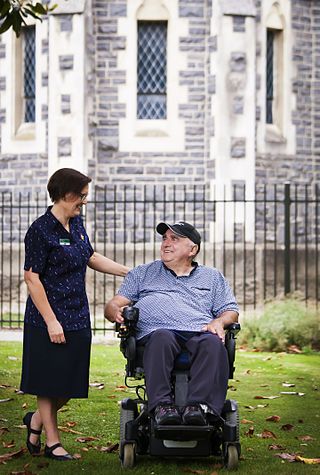
Cognitive behavioral therapy (CBT) is a psycho-social intervention that aims to reduce symptoms of various mental health conditions, primarily depression and anxiety disorders. Cognitive behavioral therapy is one of the most effective means of treatment for substance abuse and co-occurring mental health disorders. CBT focuses on challenging and changing cognitive distortions and their associated behaviors to improve emotional regulation and develop personal coping strategies that target solving current problems. Though it was originally designed to treat depression, its uses have been expanded to include many issues and the treatment of many mental health conditions, including anxiety, substance use disorders, marital problems, ADHD, and eating disorders. CBT includes a number of cognitive or behavioral psychotherapies that treat defined psychopathologies using evidence-based techniques and strategies.

Schizophrenia is a mental disorder characterized by reoccurring episodes of psychosis that are correlated with a general misperception of reality. Other common signs include hallucinations, delusions, disorganized thinking, social withdrawal, and flat affect. Symptoms develop gradually and typically begin during young adulthood and are never resolved. There is no objective diagnostic test; diagnosis is based on observed behavior, a psychiatric history that includes the person's reported experiences, and reports of others familiar with the person. For a diagnosis of schizophrenia, the described symptoms need to have been present for at least six months or one month. Many people with schizophrenia have other mental disorders, especially substance use disorders, depressive disorders, anxiety disorders, and obsessive–compulsive disorder.

Dementia is the general name for a decline in cognitive abilities that impacts a person's ability to perform everyday activities. This typically involves problems with memory, thinking, and behavior. Aside from memory impairment and a disruption in thought patterns, the most common symptoms include emotional problems, difficulties with language, and decreased motivation. The symptoms may be described as occurring in a continuum over several stages. Dementia ultimately has a significant effect on the individual, caregivers, and on social relationships in general. A diagnosis of dementia requires the observation of a change from a person's usual mental functioning and a greater cognitive decline than what is caused by normal aging.

Music therapy, an allied health profession, "is the clinical and evidence-based use of music interventions to accomplish individualized goals within a therapeutic relationship by a credentialed professional who has completed an approved music therapy program." It is also a vocation, involving a deep commitment to music and the desire to use it as a medium to help others. Although music therapy has only been established as a profession relatively recently, the connection between music and therapy is not new.
Palliative care is an interdisciplinary medical caregiving approach aimed at optimizing quality of life and mitigating suffering among people with serious, complex, and often terminal illnesses. Within the published literature, many definitions of palliative care exist. The World Health Organization (WHO) describes palliative care as "an approach that improves the quality of life of patients and their families facing the problems associated with life-threatening illness, through the prevention and relief of suffering by means of early identification and impeccable assessment and treatment of pain and other problems, physical, psychosocial, and spiritual". In the past, palliative care was a disease specific approach, but today the WHO takes a broader patient-centered approach that suggests that the principles of palliative care should be applied as early as possible to any chronic and ultimately fatal illness. This shift was important because if a disease-oriented approach is followed, the needs and preferences of the patient are not fully met and aspects of care, such as pain, quality of life, and social support, as well as spiritual and emotional needs, fail to be addressed. Rather, a patient-centered model prioritizes relief of suffering and tailors care to increase the quality of life for terminally ill patients.

Mental health encompasses emotional, psychological, and social well-being, influencing cognition, perception, and behavior. According to World Health Organization (WHO), it is a "state of well-being in which the individual realizes his or her abilities, can cope with the normal stresses of life, can work productively and fruitfully, and can contribute to his or her community". It likewise determines how an individual handles stress, interpersonal relationships, and decision-making. Mental health includes subjective well-being, perceived self-efficacy, autonomy, competence, intergenerational dependence, and self-actualization of one's intellectual and emotional potential, among others. From the perspectives of positive psychology or holism, mental health may include an individual's ability to enjoy life and to create a balance between life activities and efforts to achieve psychological resilience. Cultural differences, personal philosophy, subjective assessments, and competing professional theories all affect how one defines "mental health". Some early signs related to mental health difficulties are sleep irritation, lack of energy, lack of appetite, thinking of harming oneself or others, self-isolating, and frequently zoning out.

Art therapy is a distinct discipline that incorporates creative methods of expression through visual art media. Art therapy, as a creative arts therapy profession, originated in the fields of art and psychotherapy and may vary in definition. Art therapy encourages creative expression through painting, drawing, or modelling. It may work by providing a person with a safe space to express their feelings and allow them to feel more in control over their life.
Expressed emotion (EE), is a measure of the family environment that is based on how the relatives of a psychiatric patient spontaneously talk about the patient. It specifically measures three to five aspects of the family environment: the most important are critical comments, hostility, emotional over-involvement, with positivity and warmth sometimes also included as indications of a low-EE environment. The psychiatric measure of expressed emotion is distinct from the general notion of communicating emotion in interpersonal relationships, and from another psychological metric known as family emotional expressiveness.
Schizophreniform disorder is a mental disorder diagnosed when symptoms of schizophrenia are present for a significant portion of time, but signs of disturbance are not present for the full six months required for the diagnosis of schizophrenia.
Mental disorders are classified as a psychological condition marked primarily by sufficient disorganization of personality, mind, and emotions to seriously impair the normal psychological and often social functioning of the individual. Individuals diagnosed with certain mental disorders can be unable to function normally in society. Mental disorders may consist of several affective, behavioral, cognitive and perceptual components. The acknowledgement and understanding of mental health conditions has changed over time and across cultures. There are still variations in the definition, classification, and treatment of mental disorders.

A caregiver, carer or support worker is a paid or unpaid person who helps an individual with activities of daily living. Caregivers who are members of a care recipient's family or social network, and who may have no specific professional training, are often described as informal caregivers. Caregivers most commonly assist with impairments related to old age, disability, a disease, or a mental disorder.
Health is the state of complete physical, mental, and social well-being and a positive concept emphasizing social and personal resources, as well as physical capacities. This article lists major topics related to personal health.
In medicine, a prodrome is an early sign or symptom that often indicates the onset of a disease before more diagnostically specific signs and symptoms develop. It is derived from the Greek word prodromos, meaning "running before". Prodromes may be non-specific symptoms or, in a few instances, may clearly indicate a particular disease, such as the prodromal migraine aura.
Psychological therapies for dementia are starting to gain some momentum. Improved clinical assessment in early stages of Alzheimer's disease and other forms of dementia, increased cognitive stimulation of the elderly, and the prescription of drugs to slow cognitive decline have resulted in increased detection in the early stages. Although the opinions of the medical community are still apprehensive to support cognitive therapies in dementia patients, recent international studies have started to create optimism.
Early intervention in psychosis is a clinical approach to those experiencing symptoms of psychosis for the first time. It forms part of a new prevention paradigm for psychiatry and is leading to reform of mental health services, especially in the United Kingdom and Australia.
Caregiver syndrome or caregiver stress is a condition that strongly manifests exhaustion, anger, rage, or guilt resulting from unrelieved caring for a chronically ill patient. This condition is not listed in the United States' Diagnostic and Statistical Manual of Mental Disorders, although the term is often used by many healthcare professionals in that country. The equivalent used in many other countries, the ICD-11, does include the condition.
Nidotherapy, after nidus, is an experimental form of psychotherapy, described as "a collaborative treatment involving the systematic assessment and modification of the environment to minimize the impact of any form of mental disorder on the individual or on society".
Supportive psychotherapy is a psychotherapeutic approach that integrates various therapeutic schools such as psychodynamic and cognitive-behavioral, as well as interpersonal conceptual models and techniques.
A Mental Health Nurse (MHN) refers to a psychiatric nurse in the UK, who specializes in the care of patients with mental health issues.
Coordinated Specialty Care (CSC) is a recovery-oriented treatment program designed for people with first episode psychosis (FEP). CSC consists of collaborative treatment planning between the client and the client's care team, consisting of mental health clinicians, psychiatrists, and case managers. CSC includes individual and family therapy, medication management, psychoeducation and support, case management, and support surrounding education and employment goals. The program is considered an early psychosis intervention and is intended to be used shortly after symptoms onset.







